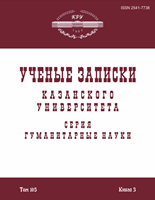Каркас русской грамматики
Russian Grammar Framework
Author(s): N.M. VvedenskayaSubject(s): Language acquisition, Psycholinguistics, Cognitive linguistics, Cognitive Psychology, Developmental Psychology
Published by: Казанский (Приволжский) федеральный университет
Keywords: developmental linguistics; speech ontogenesis; language acquisition by children; morphology; inflection; derivation; category of gender; Russian as a second language; bilingualism;
Summary/Abstract: This article provides an overview of the early stages in the development of children’s speech system. Its main features (specific ways of gender identification, simplified inflectional rules, and free derivation) constitute the backbone of Russian grammar, which in turn defines the functioning of the entire mechanism of the Russian language. These are the underlying linguistic patterns and the most general rules. Children learn them at the earliest stage of language acquisition and then modify them using more intricate and complex patterns as they continue to develop their language system. Based on the results obtained, the structure of the Russian grammar framework, an artificial model that summarizes the tendencies inherent in children’s speech at different stages of language acquisition and brings them to a logical conclusion, is outlined. When young children follow the rules of this framework, they sometimes create unique speech products that deviate substantially from the norm. However, they rely on the fixed, albeit simplified, rules and thus master the tricky issues of the grammatical system of the Russian language. Therefore, the framework of Russian grammar, or the core of the Russian language system, should be taken into account in diagnosing the level of speech development, learning Russian as a foreign language, and working with bilingual children.
Journal: Ученые записки Казанского университета. Серия Гуманитарные науки
- Issue Year: 165/2023
- Issue No: 3
- Page Range: 67-78
- Page Count: 12
- Language: Russian

